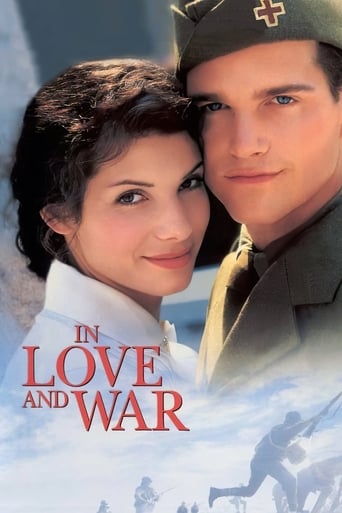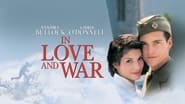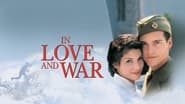anya-za
The film is based on the book Hemingway in Love and War by Henry S. Villard and James Nagel. In the movie Hemingway's real-life experience in WWI is reflected, what gives zest to the film. The story opens up with the appearance of a young energetic and craving for adventures war correspondent Ernest Hemingway. During one of the battles he gets wounded and then is sent to the hospital, where he falls in love with Agnes, an American Red Cross nurse, who saved his leg from amputation. So, their relationship is becoming to develop.This romantic movie is rather of high quality. Good cast, very harmonious music, exceedingly picturesque setting (especially Venice), perfect cameraman's job. All this immerse you into another world and makes you believe that even hardships of war can't be an obstacle for true love.Despite of the fact that my general impression was positive after watching this movie, I wouldn't like to watch it one more time, as I usually do, when a film impressed me very much. This film reminds me of a good fairy-tale, which is far from reality. The heroes are so beautiful, the war is so "clean", the setting is so romantic, everything is so, so, so… exaggerated. During watching the movie you just enjoy a good romantic story, you sympathize with the heroes, but you don't believe them.So, the movie is quite impressive and touching. I think, those, who like emotional romantic stories, would enjoy watching it but I don't advice it to those people, who expect to see a war movie. This film is more about love, not war. I would give this film 7 out of 10 points.
VladimirSviridov
The film by Richard Attenborough tells us the story of young reporter Ernerst Hemingway. As you could probably guess the film is based on a true story. Ernest Hemingway is an ambulance driver in Italy during World War I. Risking his life while saving one of the soldiers he is injured and ends up in the hospital, where he falls in love with his nurse, Agnes von Kurowsky. The film doesn't give rise to emotions. It is just a love story, one among many. However, there are some positive things. The most positive aspect of the film is acting. Chris O'Donnel and Sandra Bullock performed perfect. It is really exciting to watch how their relations develop from the point of view of their acting. They succeeded to materialize passion, emotions, feelings and love in particular. Mackenzie Astin who plays Henry Villard did his job very well. His character has a great charisma and it is always a pleasure to see him in shot. The only character who disappoints is the surgeon. He could be a nice antagonist but he happen to be just a plane supporting character. Music and sound are not memorable but still good. Now, we're smoothly moving to the negative things. The first problem of the film is story-line. The story-line in general is nice. But it could be more creative. There are little untypical for such a film things. The main character is rather irritating in his behavior. The problem is not in the actor but in the script. I liked the setting but scenery ruined it. They looked unnatural. I would mark three main characters Ernest Hemingway, Agnes von Kurowsky, Henry Villard. The characters are not memorable. There is nothing special about them. What about Hemingway's character, he is rather irritating. He is an arrogant, impudent, insolent kid who thinks that he is special or even chosen one. Agnes von Kurowsky, a nurse who can't make head or tail of her feelings. Henry Villard a person who behaves like brave soldier and young boy at the same time (especially beside Agnes). Just to sum up already mentioned I would say that it is not the worst film ever, but also it is not the best one as well. Just something average. If you are interested in love stories or in Hemingway you may give it a try. If not, don't waste your time and read the original book.
p-hogan1
I am a Hemmingway fan. I like Sandra Bullock, was very impressed with the cinematography. Production values are very high. Attenborough is a load of Emperor's clothes. I was interested to watch this film but it was --so--very--slow. Like many films and television programmes it seems to be made on the economic film principle, where, having got the cast and crew to a location/set the l-o-n-g-e-r the screen time that can be dragged out there, the cheaper the 'per minute' cost of the whole film. Whereas a single shot used to average about 3 seconds we now get 3 seconds establishing the characters in a place, a slow two shot sequence of slow moody conversation with pregnant pauses (nine months!?) and eventually one character leaves while the other pulls faces to the music, sometimes for as long as another 11 seconds.Having established the hospital we do not need to keep seeing it or people walking about it without advancing the plot.The ironic thing with this film is that Hemmingway wrote like John Ford directed. Ford started the camera and the actor on the mark and put his fist over the lens as he shouted 'cut'. One take and no way for the studio to drag out the editing. Casablanca takes place 90% in a café'e, slow? No. Curtiz did not need 600 horses to get pace.
CitizenCaine
Chris O'Donnell and Sandra Bullock star in Richard Attenborough's story of Hemingway's first love with Agnes Kurowsky, the red cross nurse. It's near the end of World War I and the young Hemingway finds love with an older red cross nurse behind the trenches after he's injured helping an infantryman to safety. This must be the Hallmark greeting card version of the story because the scenery is great, the period authentic, the dialog sentimental and proper, and the chemistry between the leads completely absent. O'Donnell has absolutely no zest to foreshadow the larger than life figure the famous Hemingway was.Maybe that was part of the point Attenborough was making with the film: the romance was more of a young man's fancy than reality. This was a film made in retrospect after the discovery of Kurowsky's love letters with the young Hemingway, and it stands to reason the truth was softened somewhat to make for a romanticized story. Some viewers will question the notion implied by the epilogue of how this episode influenced the elder Hemingway. He later wrote A Farewell To Arms, which of course he based on this same episode of his life. That film, at least the older version from the thirties, is far more satisfying than what viewers will see here. This appears to have been made strictly for the Lifetime network crowd. ** of 4 stars.






